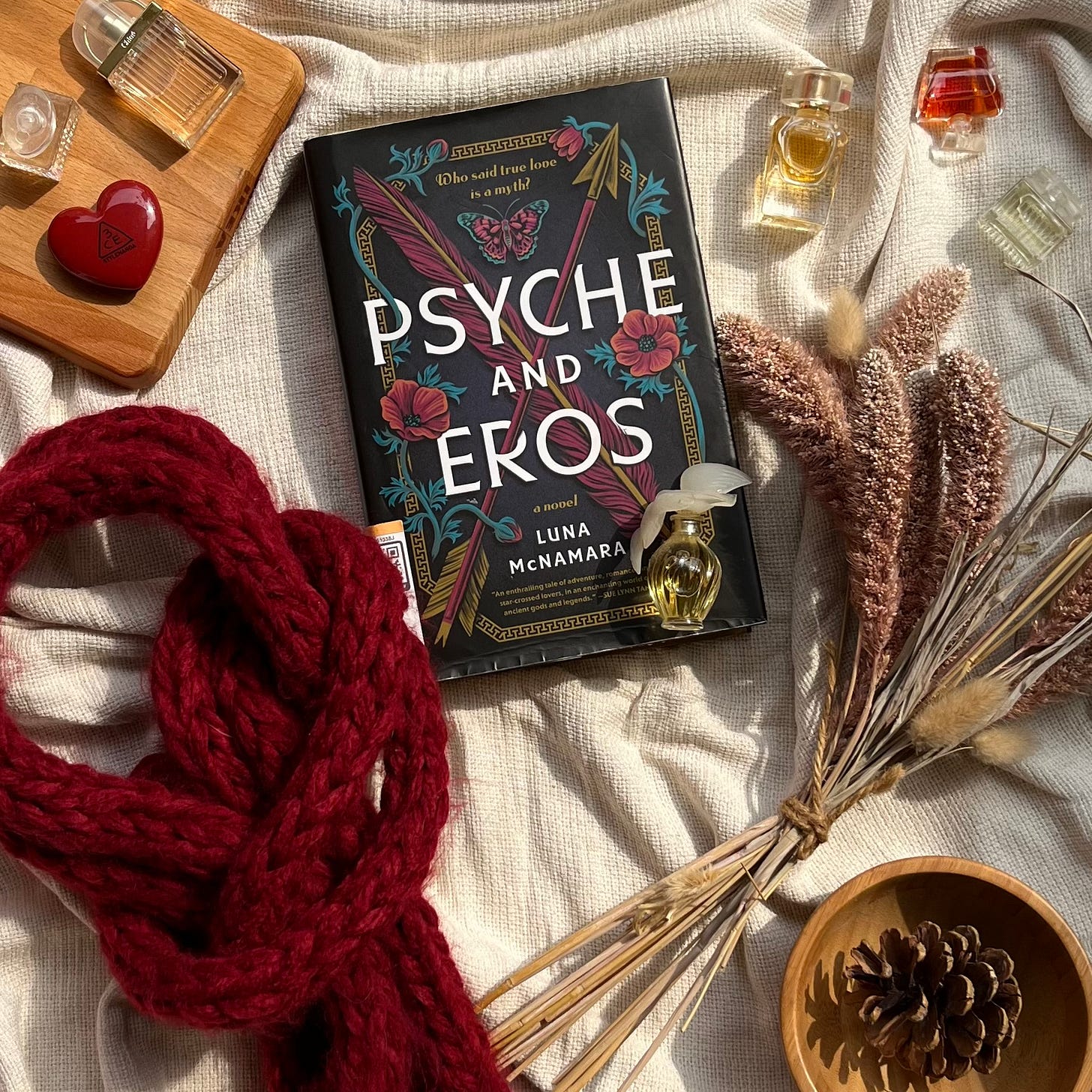Maybe my disappointment is in large part due to the fact that I just read an excellent, sophisticated, poetically rendered retelling by Caro De Robertis of the same myth, but I think that even without the direct comparison, this novel would have fallen short.
There’s a lot that can be said about the juvenile prose but I rather not waste time examining too closely what is clearly a style/skill issue that cannot be fixed at the editorial level.
I’m all for tweaking a story to suit a modern audience but I do think that there is a limit to it and that it should be done meaningfully. McNamara’s clumsy attempt strikes me more as a desire to forcibly mash together the Psyche myth with the events of the Iliad because she lacked the competence to create a fully fleshed out novel for either. Inserting Psyche into Helen’s wedding night and Iphigenia’s wedding day did absolutely nothing for the plot and didn’t even do much to shape Psyche’s beliefs beyond temporary horror at the reality of abusive men (we been knew) or sexual assault (ditto). So much unnecessary fluff was added into the story in the form of Psyche’s internal monologue with no express purpose save to signpost the author’s comprehensive knowledge of well-known Greek myths and characters. I get that it’s a debut novel and all. I just feel like I already lowered my expectations all the way but still ended up disappointed.
Some critics of De Robertis’ novel say that her portrayal of ancient Greece as homophobic is historically inaccurate, which I think is a deliberate misreading. It is stated clearly that MLM relationships were more acceptable than WLW ones because of the prevailing misogyny that punished women for having any desires that did not benefit the patriarchy. A genderbent Eros is not reinventing the wheel because desire is not gendered, and rewriting Psyche as a noble instead of a princess didn’t really affect anything because both noblewomen and princesses still get married off against their will. Having her be a noble also put her in a position to notice how women of a lower social class were living with the threat of violence that she was largely protected from. Any modifications were intentional, meaningful, and contributed to the author’s message.
In comparison, McNamara’s retelling changed a whole bunch of things simply for convenience, such as inventing a brother for Agamemnon who is Psyche’s father just to make her Iphigenia’s cousin and give her a reason to be around for the Trojan war. The author also made Psyche Atalanta’s disciple and this was made possible by Psyche’s father. They’re not Spartan, by the way. Psyche’s father independently let his one and only girl child grow up as a warrior, against all social convention and what every other royal is doing, instead of putting his energy into trying to produce a male heir to take on the mantle of the prophecy. It just doesn’t make sense. Psyche’s half-baked characterisation also makes her unlikeable and grating, which can be interesting if the author was experimenting with casting an anti-hero (like Ottessa Moshfeg), but the painful part is how Psyche is clearly meant to be a girlboss underdog heroine that you want to root for.
That’s not all. Here is how the various characters are depicted:
Eros - EmoBoy99 who doesn’t think he will ever find love but has no problem sleeping around
Psyche - as a result of her special upbringing, a huge pick-me who is defo Not Like Other Girls
Aphrodite - a catty, petty, vindictive bitch giving Regina George and nothing more
Clytemnestra - a bitter woman and shitty mother who can’t stop nagging her kids
Penelope - sister of Helen (??) who resents her marriage to Odysseus (???) and hates being at Ithaca (????)
Iphigenia - a lovesick priestess-in-training who abandons her vocation to get married to her childhood crush
Achilles - a willing party in the arranged marriage who did not know what Agamemnon had planned and tried to intervene
Patroclus - loves Achilles but they’re just normal besties
Hecate - decrepit hag who wants a shag
Demeter - hapless fretful maternal figure looking for someone to mother because her daughter left home on purpose and has a never-ending rebellious/goth phase
Persephone - a ball-busting power-hungry dominatrix who tortured animals as a child and openly cuckholds her husband with hot ghosts
Eris - tsundere lonely girl who just wants to have a friend
If it’s just one or two problematic portrayals, I can close an eye, but practically every character is unreasonably damaged in this retelling. They’re flimsy and lacking dimension. I got the sense that this work was fanfiction masquerading as a full-fledged novel. If I read it on AO3 I would have been slightly impressed by the creativity and easily overlooked the lack of substance, but not in an actual published novel.
Aside from Psyche’s parents, not a single couple out there is actually in a happy and harmonious marriage. Maybe it’s meant to show how ~special~ Psyche and Eros’ relationship is because it’s built on mutual respect and equality, given that she can kill things easily (the secret to gender equality amirite?), but it strikes me as strange how Psyche never once gave the institution of marriage a second thought or questioned how it ruins so many women’s lives despite being surrounded by so many negative examples. Her character bumbles along without really reflecting on any social issues. I can hardly call this a feminist retelling but maybe an attempt to be one, since those things are so fashionable and profitable nowadays. Towards the end, when Eros enlists the help of Demeter, Persephone, and Hecate, and they all collude to try to save Psyche, it felt so improbable and kiddy like a wannabe Percy Jackson spin-off.




